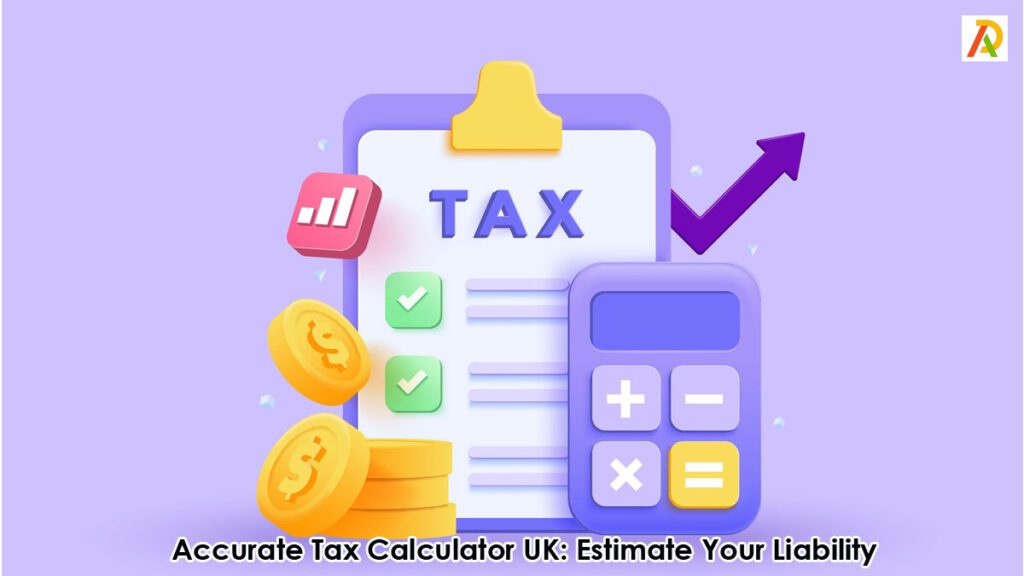Accurate Tax Calculator UK: Estimate Your Liability

Tax calculation is a crucial aspect of financial planning for individuals in the UK. Understanding how much you can earn before tax, as well as the amount you’ll take home after tax deductions is crucial. It is essential for managing your income effectively. In this article, we will delve into the workings of a tax calculator UK. We willalso explore the key components of pre-tax earnings, tax calculations, and post-tax income.
Tax Calculator UK:
A tax calculator is an online tool that enables individuals to estimate their potential tax liability based on their income, deductions, and other relevant factors. It takes into account various tax bands and rates to provide an accurate estimate of the amount an individual might owe to the government.
How Tax Calculator UK Works and its Benefits
Tax calculators are powerful tools that help individuals and businesses estimate their tax liability accurately. These online tools utilize complex algorithms based on tax laws, regulations, and rates to provide users with an estimate of the taxes they owe. Understanding how tax calculator UK works and its benefits can empower individuals to make informed financial decisions. They can plan for their tax obligations effectively.
1. Algorithmic Calculations:
Tax calculators employ advanced algorithms that take into account various factors such as income, deductions, tax brackets, and exemptions. These algorithms simulate the tax calculation process used by tax authorities. They provide users with a close approximation of their tax liability.
2. User-Friendly Interface:
Tax calculators are designed in a user-friendly way. These tools allow individuals to input their financial information without the need for specialized knowledge of tax laws. Users can simply enter their income, deductions, and other relevant details into the calculator’s interface.
3. Real-Time Updates:
Many tax calculators get regular updates to reflect the latest changes in tax laws and regulations. This ensures that the calculations are accurate and up-to-date, considering any recent adjustments to tax rates or thresholds.
4. Benefits:
a. Accuracy and Transparency:
Tax calculators provide accurate estimates of tax liability based on the information provided by users. This accuracy promotes transparency in understanding how different financial decisions impact taxes.
b. Financial Planning:
By using a tax calculator UK, individuals can forecast their tax liabilities for the current year or even several years ahead. This enables effective financial planning, allowing for better allocation of resources and budgeting.
c. Decision-Making:
When faced with various financial choices, such as a job change or investment decision, a tax calculator can help individuals evaluate the tax implications of each option. This informed decision-making can lead to optimized financial outcomes.
d. Compliance:
Tax calculators assist users in staying compliant with tax laws by accurately estimating the taxes owed. This prevents underpayment or overpayment of taxes, reducing the risk of penalties or audits.
e. Tax Optimization:
Tax calculators can also aid in tax optimization strategies. Users can experiment with different scenarios like contributing to retirement accounts or utilizing tax credits. This helps determine the most tax-efficient approach.
f. Time-Saving:
Calculating taxes manually can be time-consuming and prone to errors. Tax Calculator UK streamlines the process, saving individuals and businesses valuable time.
g. Accessibility:
Tax calculators are easily accessible online, allowing users to perform calculations from the comfort of their own homes or workplaces.
h. Empowerment:
Tax calculators empower users with a better understanding of their tax situation. This knowledge can boost financial confidence and reduce anxiety about tax obligations.
In conclusion, tax calculators are indispensable tools that provide accurate and up-to-date estimates of tax liabilities. Their user-friendly interfaces, real-time updates, and numerous benefits make them essential for effective financial planning, decision-making, and tax optimization. By utilizing tax calculators, individuals and businesses can navigate the complexities of taxation with greater ease and confidence.
How Much Can I Earn Before Tax:
Understanding the income threshold before taxes apply is crucial. In the UK, the income threshold at which you start paying income tax varies based on your age and income source. As of the 2021/2022 tax year, the Standard Personal Allowance is £12,570. This means you can earn up to this amount annually before income tax is levied. This often answers the much-asked question “how much can I earn before tax”.
For individuals aged 65 to 74, the allowance is £14,430, while those 75 and over have an allowance of £14,990. Keep in mind that these figures are subject to change based on updates from HM Revenue & Customs.
The amount you can earn before paying taxes is known as the “Personal Allowance”. It varies based on your age and specific circumstances in the UK. As stated previously, for the 2021/2022 tax year, the Standard Personal Allowance is £12,570.
Here’s a breakdown of the Personal Allowance based on age:
a) Standard Personal Allowance:
For individuals under 65 years of age: £12,570
b) Personal Allowance for Individuals Aged 65 to 74:
For individuals aged 65 to 74: £14,430
c) Personal Allowance for Individuals Aged 75 and Over:
For individuals aged 75 and over – £14,990
It’s important to note that these figures are subject to change with each new tax year. One should take into account any updates or adjustments made by HM Revenue & Customs when using a tax calculator to estimate “how much can I earn before tax”.
Additionally, certain factors might affect your Personal Allowance. These include your total income, eligibility for other tax reliefs, and whether you have income from other sources like savings or investments. Therefore, while the figures provided here serve as a general guideline, it’s recommended to use an up-to-date tax calculator. It is crucial to get the most accurate estimate of how much you can earn before tax in your specific situation.
Emphasis on Accuracy and Ease of Use in Tax Calculators
Tax calculators are indispensable tools that offer a remarkable blend of accuracy and ease of use. These calculators leverage advanced algorithms and user-friendly interfaces to provide precise estimates of tax liabilities. Simultaneously, they ensure that individuals, regardless of their tax knowledge, can effortlessly navigate and benefit from them. Let’s delve into the significant emphasis on accuracy and ease of use in tax calculators.
1. Accuracy:
Tax calculators are engineered to deliver accurate results by utilizing complex algorithms that mirror the calculations performed by tax authorities. These algorithms account for various factors, such as tax brackets, deductions, exemptions, and changes in tax laws. This accuracy is paramount for individuals and businesses to make informed financial decisions. It guarantees compliance with tax regulations.
Accurate tax calculations offered by these calculators prevent underpayment or overpayment of taxes. Ultimately, they help users avoid penalties, audits, and unnecessary financial stress. The precision achieved through tax calculators also empowers users to plan their finances effectively. They can anticipate their tax obligations with a high degree of confidence.
2. Ease of Use:
The hallmark of tax calculators is their user-friendly interface, designed to make tax estimation accessible to a wide range of users. This is regardless of their familiarity with tax concepts. Here’s how tax calculators prioritize ease of use:
- Intuitive Inputs: Tax calculators present users with straightforward input fields. There they can enter their financial information, such as income, deductions, and other relevant details. These inputs are organized logically, allowing users to navigate through the calculator effortlessly.
- Automated Calculations: Once users enter the required information, tax calculators handle the intricate calculations behind the scenes. Users don’t need to perform complex calculations manually, reducing the risk of errors and saving valuable time.
- Real-Time Updates: Many tax calculators get regular updates to demonstrate the latest tax laws and regulations. This ensures that users receive accurate estimates that align with the most current tax rules. It offers peace of mind that their calculations are based on up-to-date information.
- Accessible Anytime, Anywhere: Tax calculators are accessible online, eliminating the need for software installation or specialized technical expertise. Users can access these tools from their computers, tablets, or smartphones. This makes tax estimation convenient and flexible.
The synergy of accuracy and ease of use in tax calculators is a testament to their practicality and effectiveness. You may be an individual seeking to understand your tax liabilities or a business owner making financial decisions. Tax calculators provide a reliable means to estimate taxes with precision while ensuring a user-friendly experience. By leveraging the power of technology, tax calculators empower individuals to navigate the complexities of taxation effortlessly. They can also make sound financial choices.
Pay After Tax Calculator:
After utilizing a tax calculator to estimate your tax liability, it’s important to understand how deductions impact your take-home pay. The UK tax system operates on a tiered structure, where different portions of your income come under tax at various rates.A pay after tax calculator can help you in this regard.
Income up to the Personal Allowance is tax-free, with the Basic Rate of 20% applied to the next income bracket up to £50,270. The Higher Rate of 40% is then applicable to earnings between £50,271 and £150,000. At the same time, the Additional Rate of 45% is for income above £150,000.
National Insurance contributions also play a role in deductions. There are different classes of contributions, with rates varying based on employment status and earnings. It’s important to consider these contributions when estimating your overall tax liability with a pay after tax calculator.
A “pay after tax” calculator in the UK helps you estimate your take-home pay after deductions for taxes and National Insurance contributions. By inputting your gross income and other relevant information, you can get a clearer picture of your net earnings. This tool factors in income tax rates, tax-free allowances, and NI contribution rates. The purpose is to provide an accurate estimate of your actual pay after all deductions. Keep in mind that results may vary based on specific circumstances and any changes in tax laws. Using a pay after tax calculator can help you plan your budget effectively and make informed financial decisions.
Advantages and Disadvantages of Tax Calculators UK
Tax Calculator UK is a valuable tool for estimating tax liabilities, but it also comes with its own set of advantages and disadvantages. Let’s explore both sides to gain a comprehensive understanding.
Advantages:
- Accuracy: Tax calculators utilize complex algorithms to provide accurate estimates based on the information you input. This accuracy is crucial for making informed financial decisions.
- Time-Saving: Calculating taxes manually can be time-consuming and prone to errors. Tax calculators automate the process, saving you valuable time and effort.
- User-Friendly: Most tax calculators have intuitive interfaces, making them accessible to individuals with varying levels of tax knowledge. You don’t need to be a tax expert to use them effectively.
- Real-Time Updates: Many calculators get constant updates to reproduce the latest tax laws and regulations. This is just to ensure that your estimates depend on current information.
- Financial Planning: Tax calculators help you forecast tax liabilities, enabling better financial planning and allocation of resources.
- Decision-Making: By simulating different scenarios, tax calculators aid in evaluating the tax implications of various financial decisions, such as job changes or investments.
Disadvantages:
- Simplification: While tax calculators are accurate, they still simplify complex tax regulations. They may not consider every unique aspect of your financial situation, leading to some level of approximation.
- Complex Situations: Tax calculators might struggle with highly intricate financial situations, such as multiple sources of income, deductions, or international taxation.
- Dependency: Relying solely on tax calculators might discourage you from gaining a deeper understanding of tax concepts. This can be valuable for long-term financial planning.
- Privacy Concerns: Some online calculators may require inputting personal information, raising concerns about data privacy and security.
- Updates Delay: If a calculator doesn’t have real-time updates, you might not have the latest information on tax regulations. This potentially leads to inaccurate estimates.
- Risk of Errors: While calculators minimize errors, mistakes can still occur if you input incorrect or incomplete information.
Tax calculators offer significant advantages by providing accurate estimates, saving time, and aiding in financial planning and decision-making. However, people should use them as tools to complement their understanding of taxation, rather than replace it entirely. For complex situations, we recommend seeking advice from tax professionals. As with any tool, being aware of its limitations ensures you make the most informed decisions possible.
Conclusion:
In conclusion, understanding the intricacies of tax calculation in the UK is essential for effectively managing your finances. Utilizing a tax calculator UK empowers individuals to estimate their tax liability. It provides insight into how much they can earn before tax and their take-home pay after deductions.
As tax regulations can change from year to year, staying informed about the latest updates from HM Revenue & Customs is vital. By gaining a clear grasp of tax bands, allowances, and deductions, you can make informed financial decisions. You can also ensure you’re maximizing your income while remaining compliant with tax laws. Remember that seeking professional financial advice is always advisable for complex tax situations.


